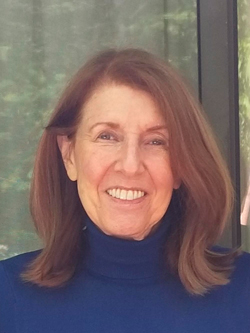51 Years Later, It Needed to Be Said
Alum News

Published December 9, 2019
When my mother was 18, she escaped from Nazi-occupied Europe.
When I was 18, I entered Smith College.
I recently saw the safe transit permit granted my mother in unoccupied Vichy France because a man at the Dutch Consulate in Lyon had given my Jewish family Dutch identity papers marked “Protestant.” In her picture on that permit, my 18-year-old mother looks up with defiance, though she did not yet know Vichy France was handing Jewish refugees to Hitler.
That image of my mother has encouraged me to express my defiance at something that happened to me as a Smith student over 50 years ago.
The summer before senior year, I began a Smith internship in Washington, D.C. We interns were housed in homes of vacationing alumnae. Granted leave to attend a wedding, I arrived one week after my housemates. No one told me they’d already established chore assignments. So when I saw garbage piled in the bin under the kitchen sink, I dumped it in the can outside. When I saw dirty dishes in the sink, I washed them.
 Soon one of my housemates approached me before work, saying, “We want to talk to you at the kitchen table tonight.” I arrived that evening to find my housemates already seated. The spokeswoman who’d called the meeting sat at the head of the table, flanked by the other women. They looked toward her expectantly. She began.
Soon one of my housemates approached me before work, saying, “We want to talk to you at the kitchen table tonight.” I arrived that evening to find my housemates already seated. The spokeswoman who’d called the meeting sat at the head of the table, flanked by the other women. They looked toward her expectantly. She began.
“It’s not because you’re Jewish that we don’t like you.”
No one said a word.
The spokeswoman began enumerating a list of grievances: I’d taken out the garbage days before the scheduled pickup (a schedule unknown to me). I asked why that mattered. “It will smell up the garbage can out in the heat,” someone replied. (I thought to myself: But it was stinking under the sink!)
She continued: I should have known they’d each chosen chores; I should have left the dirty dishes for the Dishwasher of the Week; and so on. But most of what they said was muffled behind the one salient statement.
It’s not because you’re Jewish that we don’t like you.
I moved out the next day.
Now, with my 50th Reunion behind me, I’m entranced by my mother’s look of steely defiance on the permit the Vichy government gave her because of her Protestant identity paper. And now I know what I’d like to say to the spokeswoman at that table in D.C.
“If it’s not because I’m Jewish that you don’t like me, then why mention that I’m Jewish?”
And to the women who flanked her I want to say, “You remained silent when she said that. Your silence made me assume you agreed. Your silence enabled her to say it.”
My entire life I’ve looked for answers to the question What allowed it to happen? Not just the Holocaust, that carefully planned, industrialized genocide of the Jewish people. But also, what allowed a loud-mouthed bully to become a dictator? I’ve learned that silence and inaction facilitated the dictatorship and genocide in Nazi Germany.
We cannot be silent in the face of prejudice or hatred against any group—from bullying on the playground, on the internet or in a social gathering to bullying by a would-be dictator.
I had close friends at Smith and have formed new Smith friendships since graduation. But Smith students also provided my first personal encounter with antisemitism.
President McCartney has made me feel safer in the Smith community with her statements that all of us are wanted and appreciated despite our differences.
After a career as a tax attorney in Washington, D.C., Ingrid Yollick Alpern ’69 is now the public policy committee co-chair for the organization Children and Adults with Attention-Deficit/Hyperactivity Disorder (CHADD).
This story appears in the Winter 2019-20 issue of the Smith Alumnae Quarterly.
SMITH IN MY LIFE
Have a story about how Smith has influenced your life? Send your 600-word essay to saq@smith.edu for consideration.
Illustration by Ellen Weinstein